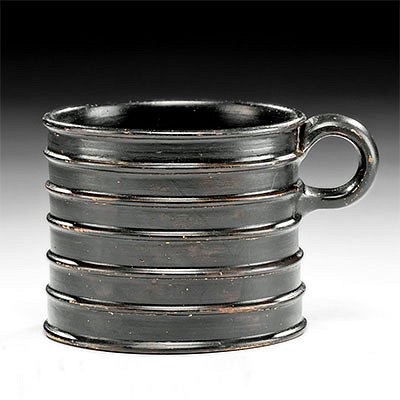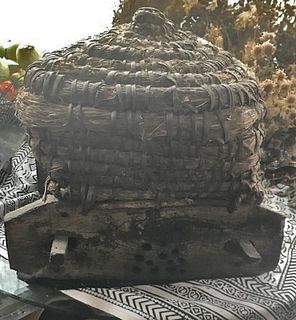Published Early Roman Glass Pillar Molded Bowl
Lot 44
About Seller
Artemis Gallery
686 S Taylor Ave, Ste 106
Louisville, CO 80027
United States
Selling antiquities, ancient and ethnographic art online since 1993, Artemis Gallery specializes in Classical Antiquities (Egyptian, Greek, Roman, Near Eastern), Asian, Pre-Columbian, African / Tribal / Oceanographic art. Our extensive inventory includes pottery, stone, metal, wood, glass and textil...Read more
Categories
Estimate:
$2,000 - $3,000
Absentee vs Live bid
Two ways to bid:
- Leave a max absentee bid and the platform will bid on your behalf up to your maximum bid during the live auction.
- Bid live during the auction and your bids will be submitted real-time to the auctioneer.
Bid Increments
| Price | Bid Increment |
|---|---|
| $0 | $25 |
| $300 | $50 |
| $1,000 | $100 |
| $2,000 | $250 |
| $5,000 | $500 |
| $10,000 | $1,000 |
| $20,000 | $2,500 |
| $50,000 | $5,000 |
| $100,000 | $10,000 |
| $200,000 | $20,000 |
About Auction
By Artemis Gallery
Mar 12, 2020
Set Reminder
2020-03-12 10:00:00
2020-03-12 10:00:00
America/New_York
Bidsquare
Bidsquare : Ancient / Ethnographic Around The World
https://www.bidsquare.com/auctions/artemis-gallery/ancient-ethnographic-around-the-world-4957
Ancient art from Egypt, Greece, Italy and the Near East, as well as Asian, Fossils, Pre-Columbian, Native American, African / Tribal / Oceanic, Spanish Colonial, Russian Icons, Fine art, much more! Artemis Gallery info@artemisgallery.com
Ancient art from Egypt, Greece, Italy and the Near East, as well as Asian, Fossils, Pre-Columbian, Native American, African / Tribal / Oceanic, Spanish Colonial, Russian Icons, Fine art, much more! Artemis Gallery info@artemisgallery.com
- Lot Description
Roman, late Republic to early Imperial Period, ca. late 1st century BCE to mid-1st century CE. A gorgeous bowl of a thick-walled composition formed from semi-translucent glass of a stunning amber-yellow hue. The slightly concave base expands gently outwards and rounds to form the walls, and a thick rim surrounds the shallow basin that itself is adorned with wheel-cut striations. The exterior is decorated with sixty-six protruding vertical ribs that are created via the pillar-molding technique where the glass is 'sagged' over a textured mold and then pulled to form the ribs. Bowls like this one were a sophisticated component of the Roman "cena," or dinner, perhaps for holding fruits, fish, or condiments like garum (fermented fish sauce). A fabulous vessel enveloped in fiery layers of silvery and rainbow iridescence. Size: 6.75" Diameter x 2" H (17.1 cm x 5.1 cm)
Published in: "Glasses of Antiquity." Fortuna Fine Arts, Ltd., New York, 2002, fig. 19.
For a strikingly similar example with a taller rim, please see The Metropolitan Museum of Art, accession number 74.51.288.
Cf. Grose, David Frederick. "The Toledo Museum of Art, Early Ancient Glass." The Toledo Museum of Art, Toledo, 1989, p. 265, no. 234.
Provenance: ex-Martin J. Wunsch collection, New York, USA, collected in the 1980s
All items legal to buy/sell under U.S. Statute covering cultural patrimony Code 2600, CHAPTER 14, and are guaranteed to be as described or your money back.
A Certificate of Authenticity will accompany all winning bids.
We ship worldwide and handle all shipping in-house for your convenience.
#152924Rim repaired from multiple pieces in a few areas, with minor restoration in some areas of loss, and resurfacing with very light adhesive residue along break lines. Minor pitting and abrasions to base, body, ribs, and rim, with light encrustations and weathering film, and some micro-bubbling within glass matrix. Light earthen deposits as well as stunning silver and rainbow iridescence throughout. Old inventory label inside of rim.Condition
- Shipping Info
-
All shipping is handled in-house for your convenience. Your invoice from Artemis Gallery will include shipping calculation instructions. If in doubt, please inquire BEFORE bidding for estimated shipping costs for individual items.
-
- Buyer's Premium



 EUR
EUR CAD
CAD AUD
AUD GBP
GBP MXN
MXN HKD
HKD CNY
CNY MYR
MYR SEK
SEK SGD
SGD CHF
CHF THB
THB















